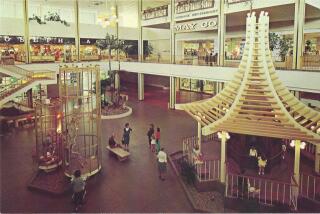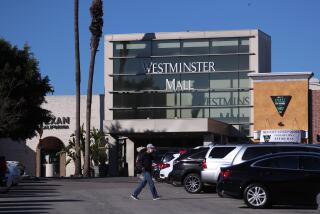EUROPE : British Government Not Sold on Suburban Shopping Malls : Development halts as officials complain that the popular centers cause gridlock and draw business away from cities.
- Share via
LONDON — While the world may have an insatiable appetite for music, movies and fast food from the United States, at least one American cultural icon has drawn the ire of officials here and may be on its way out.
Woe be to the British version of Los Angeles’ shopping-crazy Valley Girls and Boys: Officials suddenly are saying “no way” to suburban malls.
Although such commercial centers have become a big hit with British consumers who enjoy the convenience of parking in huge lots and shopping in a variety of stores--up to 300 outlets in bigger malls--the projects create massive traffic jams, particularly on weekends.
This gridlock--and the malls’ effects on other, more established retail districts--has prompted Prime Minister John Major’s government to step in this week to call a halt to unrestricted development that promotes the construction of large shopping centers just outside of Britain’s provincial cities.
The Department of Environment, which has ultimate control over national zoning matters, presented its new program in Parliament, which could effectively call a halt to the kind of mall-ing of suburban America.
Environment Secretary John Gummer told Parliament his objections to large new projects were twofold:
* Huge malls tend to attract thousands of cars, crowding local highways and polluting the area.
* Malls have drawn business away from smaller cities’ main streets, known locally as “high streets,” resulting in economic recession inside Britain’s quaint towns.
As Gummer put it: “I want to see us improve the quality of our towns so that we can reduce the pressures of urban sprawl and the development of green-field sites. That means encouraging new shopping development to locations in centers or within walking distance. We may also need to discourage development on green-field sites on the edge of cities, where it would result in an unacceptable impact on a town center.”
In recent years, Britain has seen the completion of some of the largest shopping malls in Europe, including MetroCentre, Gateshead, near the northeastern city of Newcastle; Meadowhall, outside Sheffield; Merry Hill, Dudley, near Birmingham, and Thurrock, Lakeside, northeast of London.
Gummer recently rejected another huge project near the university city of Cambridge, declaring the mall would create giant traffic snarls and would have damaging effects on the vitality of the historic town.
Three other large malls near the major cities of Manchester and Bristol and in southeast London have previously received local planning approval, but their developers are nervously waiting to see whether they may be scrapped by the Department of Environment.
Developers and retailers, of course, have rushed to defend the mall concept.
“We believe that shopping centers and town center retailing can live and survive together,” said Heather Davis, marketing manager of Thurrock, Lakeside Center, which opened in 1990, has a 12,000-space parking lot and is visited by 350,000 shoppers during peak weeks. “The consumer is attracted to the shopping centers because of easy parking, access for the disabled and sometimes creche (child-care) facilities.
“As the town center offers this, more people will be attracted to shop there,” Davis said. “There will be a consumer demand for (our) shopping centers until the town centers can offer what we do.”
But Gummer still may have the last word. As one of his officials put it: “In the future, the bigger the development, the less likely it will be built. Effectively, there are not going to be any more of the big ones.”
More to Read
Sign up for Essential California
The most important California stories and recommendations in your inbox every morning.
You may occasionally receive promotional content from the Los Angeles Times.










